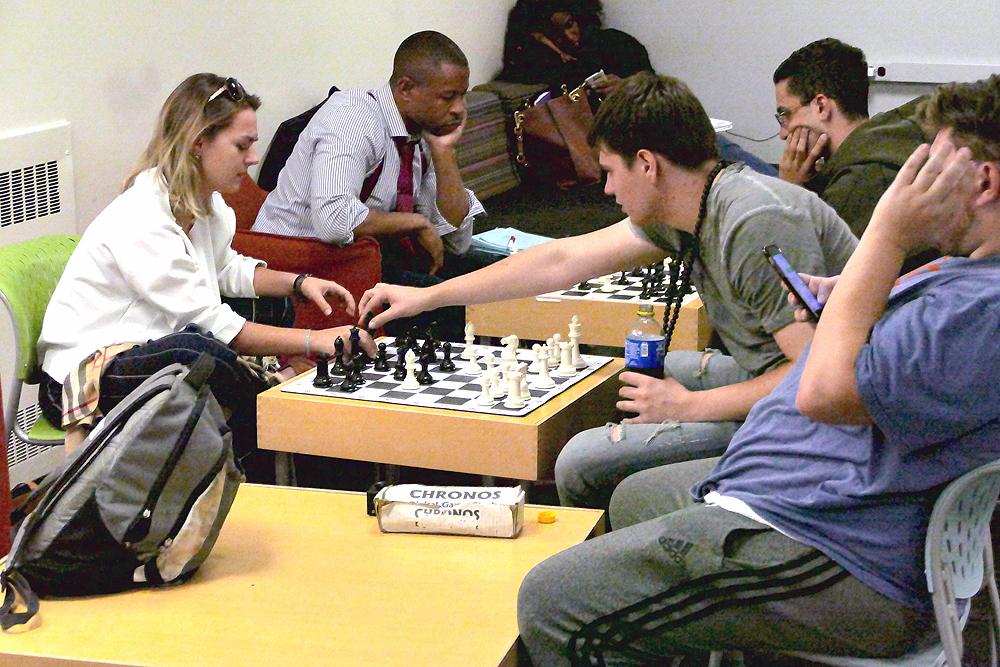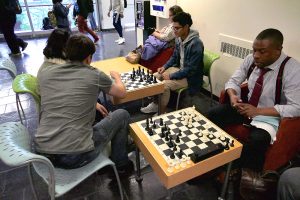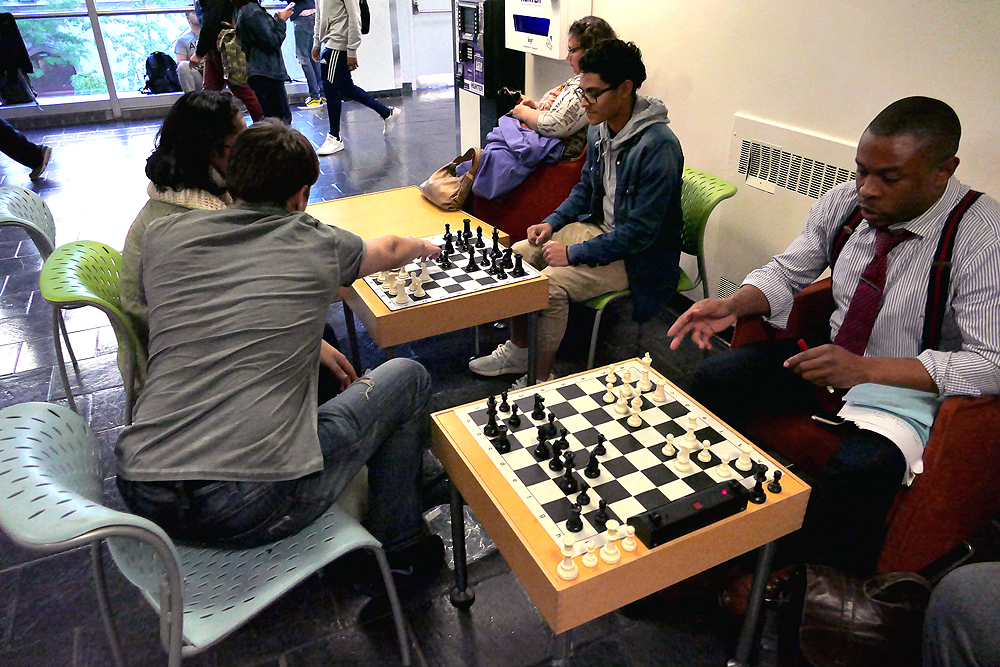[Editor’s Note, October 15, 2017: I was notified by Guest Writer Vladimir Zark that there were alleged inaccuracies in this article below. He submitted a revision which is now under review and should be published shortly.]
It is my pleasure as President of the Chess Club at Hunter to introduce myself and all the great activities members engage in at this social club.
Incoming freshmen and even long-time students have difficulty navigating the clubs. Many clubs have obscure locations, can’t advertise well enough and aren’t inclusive enough to make room for new members. Furthermore, the social effort made to attract students to activities and clubs is practically nonexistent.
There is, simply, poor communication for students, and, more importantly, it is can be difficult making meaningful human connection. The Chess Club doesn’t have these problems.
We at Chess Club understand that students are quite preoccupied and busy. We also understand that everyone who comes to our tables to play is usually a casual player and not a full-time expert or master. We respect such students because they have taken the mental and emotional energy necessary to come to us and ask for help, to inquire further, to want to realize their true potential.
There is no bridge between our strongest players and our weakest, indeed, we’re one consciousness of love and respect. Rarely do we have a session of chess club when somebody felt marginalized or ostracized, and even more rarely have we had a session when anyone failed to learn something. The effort chess club makes to engage incoming players, not to mention sharpen the spiritual bond between us as students, is really something else, even to me.
There is also something remarkable about how we make and can be contacted. We don’t have a meeting room. We are in the roaming expanse of the third floor of Hunter West, the main lobby area by the escalators. I make it my duty to arrive there by 12 p.m. every day, though I wake up at 10 and live more than an hour away. I am essentially the backbone of the club, though I don’t take any undeserved credit for it.
Prior to being president, the club was in the hands of my friend Victor, who, a passionate chess player, limited the club to the confines of a small and isolated classroom on the fourth floor of Thomas Hunter Hall. And, again, I mean no offense to him, but I feel that my ‘socialized’ approach has done a lot more for chess and for new members.
We have an active Facebook group, “Hunter College Chess Club.” We have flyers posted up around the third-floor area, and we make an effort to engage people, sometimes going as far as yelling “Chess Club” at the top of our lungs. Though this may sound rambunctious, it’s also reflective of the spirit of our club. We love this game. We are truly nerds. We will never apologize for it.
It’s also quite wonderful, to me at least, the depth produced over chess. We don’t just talk about chess. We talk about life, philosophy, politics, relationships, our own personal issues, the truth, and so on. We don’t talk about boring things. An interesting chess game can give way to interesting ideas, after all. It’s to be expected that when you get students from all walks of life, you can see their personalities exacted in the chess game as well.
We attract professors, as well! I’ve met about four professors who have an interest in the game, and three could be considered strong players. It’s fascinating how an academic, a person trained in the art of teaching and research, will take to such a logical and judgmental game. Perhaps they enjoy the rush of competition. Indeed, I am so happy that I can find myself talking to these professors as though they’re my best friends, just by way of a simple board game.
Even janitors, working class people, have come to me and tell me how much they love what I’m doing. And I appreciate them too.
Schedule
The Chess Club meets Mondays from 12-2:30 p.m., Tuesdays from 12-4 p.m., Wednesdays from 12-5:30 p.m., and Thursdays from 12-2:30 p.m. Essentially, these are my hours when I’m not taking classes, but it is unfortunate that I do sometimes get overtaken by such love for the game that I cut class anyway. If I see a new player or someone unfamiliar, I will often stop my own game to help immerse them into the experience, make them comfortable, and set them up for either a game or a lesson.
Alex Ostrovskiy, Azeez Alade, Tyrone Davis
I hope I never have a moment when I neglect a person interested in chess. Though the main goal of our club is to teach and help chess players improve themselves, our deeper goal is to help people realize their latent potential, laugh at themselves out of gentle humility and respect themselves for what they are – even if they’re not chess experts or masters now, they CAN be, and that’s all that counts.
We love those people who come by often, and we appreciate the effort every person makes to ask me questions, express concerns, and realize their own unique chess personality, which every person has. The Chess Club attracts very strong competition. I consider myself a skilled chess expert, a person who has devoted five serious years to the game. However, every national and international master pushes me to learn more and challenge myself. Alex Ostrovskiy, one of the strongest, 21-year-old players in New York, is studying education at Hunter.
I will give him the necessary credence and respect, both as a player and a person, because he comes by and glorifies me with blitz games. He also talks to me, engages me, and doesn’t come off as a snobbish narcissist, unlike many players in his skill range. I’ve done alright against him, but to be honest: He gives me three minutes to move, he takes 1, and has won about 14 out of 17 games. Two wins and one draw are more than satisfactory for me, however.
But that’s because all the decency and respectfulness of Alex becomes subsumed into a cold killer instinct when he plays. Namely, he has the capacity to turn off emotionally and doesn’t panic almost at all. It’s the quality of a true mystic and yogi, a disciplined mind that doesn’t desire anything other than a clean victory.
Other than him, there are national masters like Azeez Alade, who’s in the armed services and studying for a degree in computer science, and Tyrone Davis, a 16-year-old wizard studying at Hunter, and will likely be doing a computer science degree as well. It goes to show what kind of minds are perfect for the game!
Tournaments, ELOs
The Hunter Chess Club hopes to use its future budget for tournaments and lessons, but plans change based on the circumstances. In general, we are quite okay with equipment, seeing as I provide two sets and two clocks of my own, but we have backup sets and clocks if need be. We are quite happy to send aspiring players to participate in tournaments, seeing that true players are born when given a numerical rating, an ELO, and begins to see their skill level scale with each win, loss, or draw that they receives.
This is not for the faint of heart, since anxiety can rip apart even the toughest of people, I think, however, that it’s an excellent test of character, and matches the academic rigor of the college. Many students stress over exams, homework and deadlines, but a principled chess player treats these the same way as the game – you must win.
All in all, Chess Club is a beautiful little seed that my friends and I have planted and cultivated for more than a year now. And if we could somehow become the most widespread and popular club on this campus, if not at CUNY, I’ll say that it can only help. I see so many people who see us play and passively say that they “aren’t good enough to play,”, yet no one puts up those mental barriers but them. I want to dissolve those barriers, destroy the biases that make us fearful and insecure, and finally free people from themselves.
Chess doesn’t only invoke the powers of the mind, but it allows us freedom of the soul itself, if you want to believe we have souls. But even souls don’t exist, I cannot deny that my soul has spoken to me many a time when I sat down and played a blitz game. There’s a stereotype that you have to calculate many moves ahead to win in chess, but I say that’s foolish. All you must do is BELIEVE in your own ability to win, use your strength of will, and battle through the oppressive limitations of circumstance.
I hope to see WORD readers as well as others at our club. We will work tirelessly until we can make you the best chess players and human beings you can be. There is no reason to be afraid. You can reach out, you can ask for lessons, you can take back moves, and you can make new friends in the process. You can be yourself, I swear – that’s why this club is here for you all.
Important Links:
– Hunter College Chess Club Facebook
– Vladimir Zark
– Alex Ostrovskiy’s Facebook
– Azeez Alade’s Facebook
– Tyrone Davis’s Facebook



